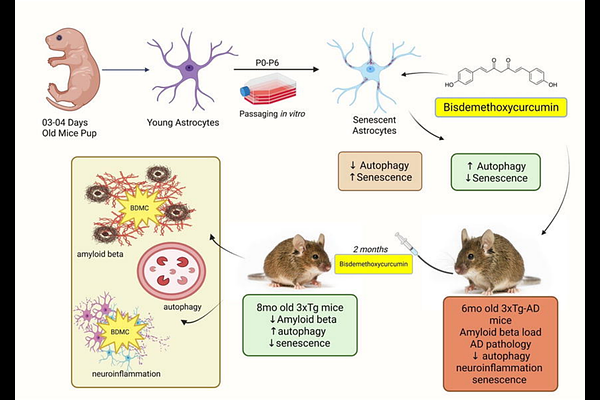Bisdemethoxycurcumin mitigates Alzheimer disease pathology through autophagy-mediated reduction of senescence and amyloid beta

Bisdemethoxycurcumin mitigates Alzheimer disease pathology through autophagy-mediated reduction of senescence and amyloid beta
Khajuria, P.; Kour, D.; Sharma, K.; Singh, L.; Banoo, R.; Manhas, D.; P, R.; Nandi, U.; Bharate, S.; Ahmed, Z.; Kumar, A.
AbstractAD pathology is accompanied by increased senescence and reduced levels of autophagy in the brain. We investigated whether pharmacologically inducing autophagy could alter the senescent phenotype and help ameliorate AD pathology. We discovered that Bisdemethoxycurcumin (BDMC), a natural compound found in Curcuma longa, stimulates autophagy in primary astrocytes. We found that autophagy and senescence exhibit an inverse relationship in aging astrocytes, with increased expression of senescent proteins and downregulation of autophagic proteins. However, treatment of aged astrocytes with BDMC reversed the senescent phenotype by ameliorating the impaired autophagy. Interestingly, the senescent phenotype persisted when autophagy was downregulated by knockdown of AMPK. Additionally, BDMC-induced autophagy aided in the removal of amyloid beta that was administered externally to the astrocytes. Further, to validate these results in a mouse model of AD, we confirmed that BDMC can significantly penetrate the blood-brain barrier (BBB) in mice. Therefore, we administered 50 and 100 mg/kg b.w. of BDMC to transgenic 3xTg-AD mice for two months. In their hippocampus, the Control 3xTg-AD animals showed more senescent cells and lower autophagy levels. In contrast, autophagic proteins were significantly upregulated while senescence indicators, such as senescence-associated secretory phenotype (SASP) proteins, were sharply downregulated in the brain of treated animals. Additionally, we discovered that the treated mice's hippocampus had a significantly lower amyloid beta load. These molecular changes in the brain were ultimately reflected in the improved working memory and neuromuscular coordination behavior of mice treated with BDMC. This study warrants further evaluation of BDMC for the management of AD.